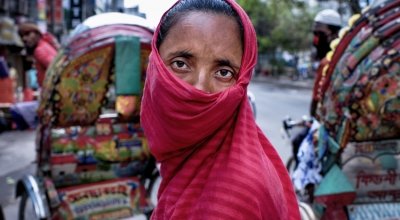
Knowledge Hub
Cyclone Amphan: our response

Last week, one of the worst storms in decades hit Bangladesh, leaving a path of death and destruction in its wake. With the help of our partners, we are on the ground responding to the devastating effects of Cyclone Amphan.
Super Cyclone Amphan was the strongest storm ever recorded in the Bay of Bengal, with wind speeds reaching 165 miles per hour. Hitting Bangladesh last week, the deadly storm ripped apart tens of thousands of homes, tore down trees, washed away bridges and killed at least 26 people. Around 100,000 people are now without homes, forced to live in waterlogged conditions with limited access to fresh water, food and income.
The consequences are catastrophic.
An added threat
However, as well as losing homes and loved ones, communities in Bangladesh have an added threat: the coronavirus (Covid-19).
Natural disasters such as cyclones have always increased the prevalence of diseases and illnesses such as cholera and E. coli, but this is the first time that vulnerable communities have had to also deal with Covid-19. As a result, many are too afraid to use the government temporary storm shelters for fears that the disease will start to spread rapidly.
“All people living here pre-cyclone Amphan were struggling due to Covid-19, but the super cyclone Amphan increased their suffering and now many of them are either living in cyclone shelters or under open sky", Hasina Rahman, Concern’s Bangladesh Country Director said.
Although the government and NGOs worked to disinfect shelters and provide additional shelters to enable people to observe social distancing, many people were reluctant to use them and were holding off until the last minute.
How we're helping
Concern have been in Bangladesh for almost five decades, where there are still roughly 40 million people living in poverty and 20 million extremely poor. Our programmes help to reduce poverty, improve health and nutrition, build resilience and respond to emergencies, including cyclone Amphan. We are responding by:
- Working towards building and extending hygiene and clean-water facilities in nine coastal areas with help from the Start Network in order to prevent water-borne diseases such as cholera, E. coli and fevers.
- Planning to build a number of wells, toilets and handwashing facilities in crowded public areas with local charity partner Rupantar. A number of ponds will also be disinfected so the communities can once again use the facilities.
- Distributing 1,000 hygiene kits – which include soap, detergent, sanitary products for women and disposable face masks – to vulnerable people who are in most need.
- Providing 35 recently homeless families with temporary shelter.
We are also helping to prevent the spread of Covid-19 across the country by distributing food, providing gloves and masks, increasing awareness campaigns on hygiene promotion and distributing information leaflets about the virus to vulnerable communities.
If you’d like to help us continue to prevent the spread of coronavirus in Bangladesh, please donate to our Coronavirus Emergency Appeal
Other ways to help
Donate now
Give a one-off, or a monthly, donation today.
Join an event
From mountain trekking to marathon running, join us for one of our many exciting outdoor events!
Buy a gift
With an extensive range of alternative gifts, we have something to suit everybody.
Leave a gift in your will
Leave the world a better place with a life-changing legacy.
Become a corporate supporter
We partner with a range of organisations that share our passion and the results have been fantastic.
Create your own fundraising event
Raise money for Concern by organising your own charity fundraising event.





